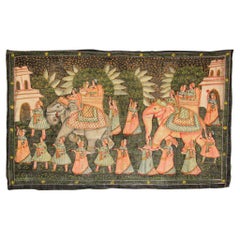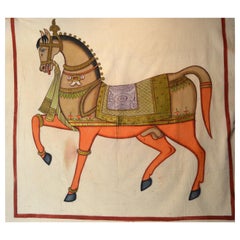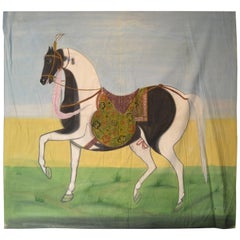Mughal Painting On Cloth
Early 20th Century Indian Anglo Raj Paintings and Screens
Textile
Recent Sales
Antique 19th Century Indian Paintings and Screens
Fabric
Antique 19th Century Indian Paintings and Screens
Vintage 1950s Indian Agra Paintings and Screens
Silk
People Also Browsed
Antique Late 19th Century Italian Renaissance Porcelain
Porcelain
Vintage 1920s French Art Deco Vases
Blown Glass
21st Century and Contemporary Natural Specimens
2010s Brazilian Natural Specimens
Crystal, Quartz, Rock Crystal
Antique Mid-19th Century American Victorian Fountains
Concrete
Antique 19th Century French Jars
Terracotta
21st Century and Contemporary Ukrainian Organic Modern Chairs
Wool, Foam, Wood
Antique 19th Century Chinese Jars
Crystal, Other
Mid-20th Century American Nautical Objects
Shell
Late 20th Century Uzbek Modern Chinese and East Asian Rugs
Metallic Thread
20th Century Chinese Models and Miniatures
Agate, Multi-gemstone, Metal, Enamel
20th Century Chinese Models and Miniatures
Agate, Jade, Metal, Enamel
20th Century Chinese Models and Miniatures
Metal, Enamel
Antique 19th Century English Other Vases
Glass
20th Century Italian Animal Sculptures
Malachite, Metal, Silver
Antique 19th Century Chinese Qing Scholar's Objects
Jade
Finding the Right Paintings-screens for You
Traditional Asian paintings were often created on scrolls and folding screens. Artisans made screens that could be folded up or spread out by connecting several panels using hinges. Today, antique Asian folding screens and paintings are sophisticated decorative accents that can serve as makeshift partitions to ensure privacy.
The original folding screens were created by Chinese artists. The earliest record of screens comes from the 2nd century B.C., and surviving examples date back to the Ming dynasty. Chinese painting utilizes many of the same tools as calligraphy — these screens were crafted from wood with painted panels featuring striking art or calligraphy that told cultural stories or represented nature and life in the area.
The practice was introduced to Japan, where paintings for screens were made on paper and silk, in the 8th century. These paintings frequently feature subjects such as landscapes, animals, flowers and Buddhist religious themes. Along with screens for tea ceremonies and dance backgrounds, there were screens for use in Shinto and Buddhist temples.
In the 17th century, screens began to be imported to Europe where their popularity grew. Coco Chanel famously collected Coromandel folding screens.
Traditional Asian paintings can make a tasteful addition to any wall, and screens can be used as decoration or, in the case of larger iterations, as an aesthetic way to divide a large room. Browse the selection of antique Asian paintings and screens from a variety of styles and eras on 1stDibs.
- 1stDibs ExpertApril 5, 2022The Mughal School of miniature painting was an art style that yielded many notable miniature paintings between the 16th and 18th centuries, but two of the most renowned works were the Hamza Nama and the Tuti-nama. Miniature painting was used to illustrate and embellish books and featured exquisitely delicate and intricate detail. Shop a range of authentic Mughal miniature paintings on 1stDibs.
- 1stDibs ExpertApril 5, 2022The Mughal style of miniature painting started in the courts of the Mughal Empire in modern-day India and Pakistan. Mughal miniatures are known for their small size and attention to detail. You’ll find a collection of antique Mughal miniatures on 1stDibs from some of the world’s top sellers.
- 1stDibs ExpertApril 5, 2022The Mughal miniature painting is a style of Indian illustration that flourished between the 16th and 18th centuries. Mughal miniatures are usually very small and feature intricate details. Shop a collection of antique Mughal miniatures from some of the world’s top sellers on 1stDibs.
- 1stDibs ExpertApril 5, 2022The subject matter of Mughal miniature paintings varies from piece to piece. Common subjects include scenes from mythology, illustrations of secular texts, portraits of well-known men and depictions of historical events. On 1stDibs, find a range of Mughal miniature paintings.
Read More
Symbols of Happiness and Rebirth Adorn This Japanese Satsuma Bowl
Decorated with white cranes and the sought-after thousand-butterflies motif, the Meiji-period vessel offers both a celebration of traditional aesthetics and a clear reflection of the era’s appetite for exquisite export pieces.
Chicago’s Pagoda Red Has a Spirited Mix of Asian Antiques and Bold New Art
For 25 years, gallerist Betsy Nathan has leveraged her keen eye and key connections to bring a unique selection of rare finds to the market.
In L.A., Gallerist JF Chen Has Long Championed Eclectic Blue-Chip Design
Now working alongside his daughter Bianca, dealer Joel Chen has presented a most covetable array of antiques, art and contemporary creations for more than 40 years.
12 Calming Spaces Inspired by Japanese Design
From cherry-blossom-adorned walls paired with glamorous lighting to wood-paneled ceilings above checkerboard-patterned chairs, these 12 spaces seamlessly blend Eastern and Western aesthetics.
Rodrigo Rivero Lake’s Mexico City Showroom Is a Museum-Worthy Trove of Spanish Colonial and Asian Antiques
The dealer and curator has spent the past 50 years amassing a collection of exceptional art, furniture and architectural elements that trace the cultural influence of the Spanish empire from Europe to the Americas and beyond.
16 Refined Asian-Inspired Interiors
These spaces exemplify how Eastern elements elevate a home's decor.


